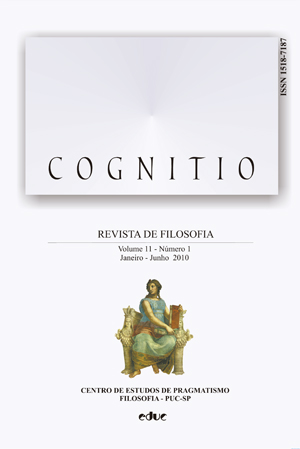Buscando o Caminho do Meio na Filosofi a Pragmatista da Religião
Palavras-chave:
Dewey, Filosofia da religião, James, Kant, Metafísica, Naturalismo.Resumo
Este ensaio esclarecerá a natureza da metafísica, pragmaticamente entendida, examinando a ideia de um “caminho do meio”, ou via media, no contexto da fi losofi a pragmatista da religião. Em metafísica e em outras disciplinas, a posição fi losófi ca mais razoável frequentemente se situa entre dois extremos implausíveis, embora as posições extremas possam ser mais interessantes. Este artigo, tentando identifi car e defender algumas opções para “aquele que busca o caminho do meio”, sugere que uma metodologiapragmatista é uma abordagem plausível para quem tenta manter o meio termo, e que versões promissoras dessa metodologia podem ser encontradas nos pragmatismos de William James e John Dewey. Os estudos de caso Jamesianos e Deweyanos a serem analisados vêm da fi losofi a da religião.Primeiramente, considera-se a forma pragmática com que James lida com as questões metafísicas (inclusive religiosas) no Pragmatismo, também em comparação com as antinomias de Kant; subsequentemente, discute-se a filosofia da religião pragmaticamente naturalista de Dewey, conforme essas mesmas linhas. Por conseguinte, em vez de explorar as perspectivas da metafísica pragmatista em termos gerais, este tópico será abordado através desses dois estudos de caso focando, principalmente, os aspectos metafísicos da filosofia da religião; isto, todavia, gera uma moral geral cuja importância se estende além da fi losofi a da religião, pois a metafísica fi nalmente emerge como dependente da ética.
Métricas
Carregando Métricas ...
Downloads
Publicado
2013-01-22
Como Citar
Pihlström, S. (2013). Buscando o Caminho do Meio na Filosofi a Pragmatista da Religião. Cognitio: Revista De Filosofia, 11(1), 101–121. Recuperado de https://revistas.pucsp.br/index.php/cognitiofilosofia/article/view/13380
Edição
Seção
Artigos Cognitio









